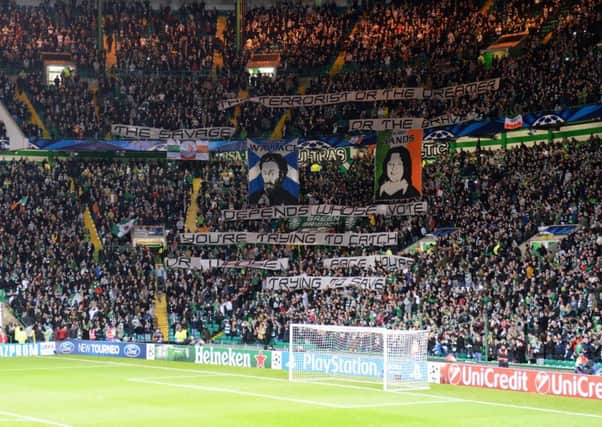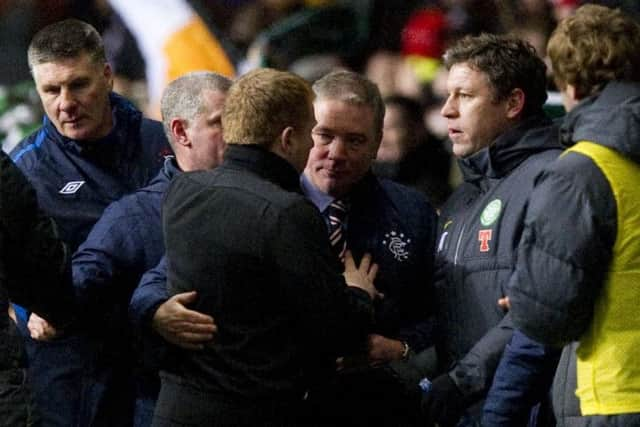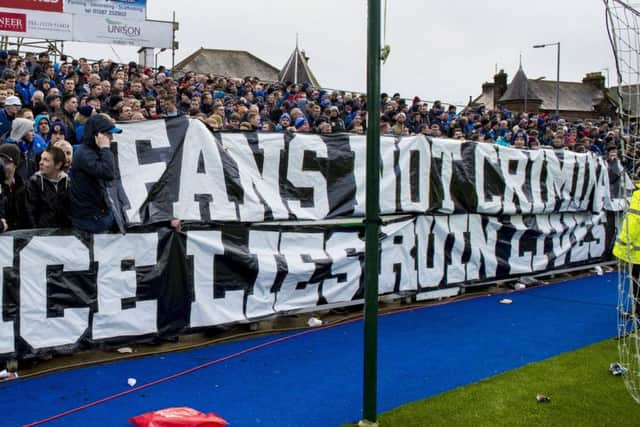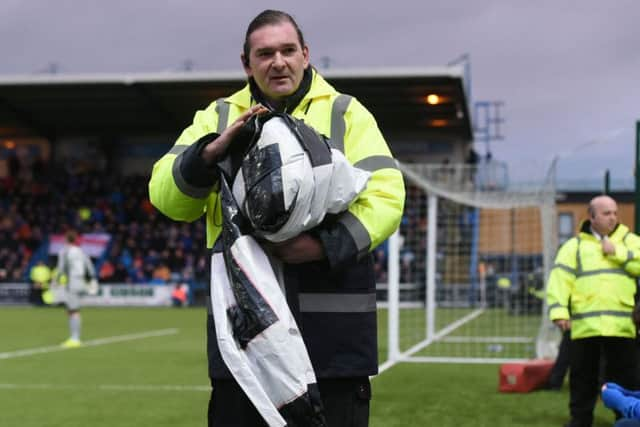Insight: If the act goes, who tackles offensive behaviour?


March 2, 2011, was a seminal day in Scottish football. After a bad-tempered Celtic/Rangers Cup tie, which saw three sendings off and 13 yellow cards, Neil Lennon and Ally McCoist squared up to each other on the touchline like a couple of drunks at chucking out time. The footage of the two men was beamed across the world: yet another reminder of Scotland’s not-so-secret shame.
The confrontation came at the end of a fractious season; trouble had flared at several matches, Lennon had been sent death threats and Strathclyde Police were getting jumpy. The then chief constable, Stephen House, was concerned not only by outbursts of disorder, but by the rise in domestic violence he said coincided with Old Firm clashes. Within days, the Scottish Government had called a sectarianism summit and all parties had pledged to work together to tackle the problem.
Advertisement
Hide AdAdvertisement
Hide AdDuring the SNP’s first term, the issue of sectarianism had been played down. Unlike Jack McConnell, who highlighted the country’s history of Catholic/Protestant antagonism and introduced new legislation which allowed courts to impose additional penalties for religiously aggravated offences, Alex Salmond as first minister seemed uneasy about drawing attention to a problem most believed was on the wane. Now, however, the pressure to take action was irresistible. Just 10 months after the confrontation, the controversial Offensive Behaviour at Football and Threatening Communications (Scotland) Act (OBFA) passed into law.


Right from the get-go, the legislation was criticised as knee-jerk and potentially counter-productive. Football supporters, lawyers, opposition politicians and civil rights campaigners questioned both the principle and the workability of the Act. But the police were in favour, and though every other party – Labour, the Conservatives, the Lib Dems and the Greens – opposed it, the SNP’s majority meant it passed by 64 votes to 57.
The past four years has produced 231 convictions but no let-up in the backlash. Although the SNP says the public supports the law – and can produce the polls to prove it – its critics regard it as a highly politicised assault on free speech that has further eroded the relationship between police and fans. Little wonder then that the OBFA looks set to be the first casualty of the SNP’s lost majority.
It took less than a fortnight for Glasgow Labour MSP James Kelly to announce he was introducing a private members bill to force its repeal: a victory of sorts for the Celtic-led Fans Against Criminalisation (FAC) which has waged a long-running campaign against it. Though Nicola Sturgeon appeared sanguine, and questioned Labour’s priorities, she is unlikely to relish a clash over a law that has been held up as the embodiment of the party’s perceived authoritarian tendencies.
But is the Act really as pernicious as its opponents claim? And if it is scrapped, then what – if anything – will replace it? With Rangers back in the Scottish Premiership and a season of Old Firm games ahead, are we ready to accept sectarian songs and abuse as part and parcel of Scottish football or should the clubs be willing to take more responsibility for the behaviour of their supporters?


According to Kenny MacAskill, the justice secretary at the time the Act was passed, new legislation was necessary because the clubs had failed to tackle abuse perpetrated by a minority of fans (although they could hardly be held responsible for incidents away from the grounds).
The Act encompassed all “offensive” utterances made in a footballing context, but has largely been used to crack down on songs which are considered sectarian or which endorse a terrorist organisation. The SNP points to the reduction in the number of charges since 2011 as evidence of the Act’s success. In 2014-15, there were 193 charges under Section 1, a reduction of 6 per cent on 2013/14 and 28 per cent on 2012/2013. A poll conducted by Panelbase in May last year found 60 per cent of Scots supported the Act, with only 14 per cent calling for its abolition.
“A very important part of this Act was the message it sends out, that we take combating sectarianism very, very seriously here in Scotland,” said SNP MSP James Dornan last week.
Advertisement
Hide AdAdvertisement
Hide AdNo doubt the SNP takes comfort from remembering how little public support then Scottish Labour leader Jim Murphy gained from his general election pledge to let football fans take alcohol back into grounds – a move widely condemned as populism. They will also be relying on the revulsion many modern-day football fans have for the atmosphere of intimidation that continues to pervade some high-profile clashes. “Not long ago, I took my children to an Old Firm match and was horrified by the abuse that was being hurled back and forth over our heads,” says one long-term fan.


On the other hand, the legislation has some very high-profile opponents: in March, 50 leading figures, including historian Professor Tom Devine, broadcaster Stuart Cosgrove and leader of the Scottish Greens Patrick Harvie signed a letter demanding it be scrapped.
The problems with the Act have been well-rehearsed: its critics believe that criminalisation of offensive language is an attack on freedom of speech and that making some acts – such as the singing of “sectarian” songs – an offence only in the context of a football match is inherently discriminatory.
There are issues too with the Act’s implementation. Offensiveness is subjective; there have been interminable debates about whether the words of, say, Roll Of Honour, which commemorates the ten IRA/INLA hunger strikers who died in 1981, represent the glorification of a proscribed organisation or an expression of Irish culture and identity, as Celtic’s ultras, the Green Brigade, contend. Some prosecutions for singing Roll Of Honour have ended in convictions and some in acquittals, suggesting a lack of consistency.
Several lawyers have argued existing laws – including breach of the peace – were sufficient to deal with sectarian behaviour at football matches and that the new legislation has led to heavy-handed tactics such as the filming of fans. One young supporter was arrested for wearing a pro-Palestinian T-shirt.


Some Celtic fans also believe the Act has been used disproportionately against them, although the statistics published by the Scottish Government suggest a near-parity in the number of arrests.
“We believe the Act is unamendable because it does two things that are unacceptable,” says FAC member Jeanette Findlay. “It makes activities criminal in the context of a regulated football match which are not otherwise criminal – and that cannot be sustained.
“But it also says offensiveness, in and of itself, is a crime, which is presumably why organisations such as Liberty have opposed it since the start.”
Advertisement
Hide AdAdvertisement
Hide AdFindlay believes the Act has been politicised, with the then Lord Advocate, Frank Mulholland, acting as a “poster boy” for the legislation, and pressure placed on the police and Procurator Fiscal Service to proceed with charges in order to send out a message. In particular, she points to the introduction of three football liaison prosecutors.
“What you have is a law which has had an unbelievable impact on people’s lives, but also a corrupting effect on the body politic because of the blurring of lines between the executive, the judiciary and the fiscal service,” she says.
An independent evaluation of the Act carried out by the University of Stirling, ScotCen Social Research and the University of Glasgow agreed it had led to a reduction in sectarian offences, but said some sheriffs felt it constituted a breach of human rights. The evaluation also highlighted an increased tension in the relationship between police and fans and a perception that resources were being diverted away from the monitoring of more violent groups.


Findlay says the songs at which the legislation is aimed were dying out and all the Act has done is to rekindle young people’s enthusiasm for singing them. Certainly, for a while, resentment over the legislation seemed to be encouraging the Green Brigade to push the boundaries with ever more provocative displays.
In 2013, the club was fined £42,000 by Uefa after the Ultras made a banner which showed William Wallace and Bobby Sands with the message: “The Fighter or the Dreamer. The savage or the brave. Depends whose vote you’re trying to catch or whose face you’re trying to save.” Another banner showed an officer with a camera and the words: “Police state brought to you by the SNP.”
Findlay isn’t looking for alternative measures to replace the Act because she doesn’t believe Scottish football has a particular problem with sectarianism. “Are offensive things sometimes said at football matches? Yes, they are,” she says. “But offensive things are also said at bowling clubs, the theatre and online. “
For others, though, the issue is less clear-cut. According to the evaluation, most football supporters in Scotland have heard sectarian abuse at matches and there are concerns sentiments expressed there filter down to the rest of society.
Last year, a social attitudes survey showed nine out of ten Scots believe football is a cause of sectarianism. A match between Rangers and Hibs in December, at which Rangers fans could be heard singing the banned Billy Boys song, might have confirmed those views.
Advertisement
Hide AdAdvertisement
Hide AdNorthern Irish academic Dr Duncan Morrow, who is heading an independent advisory group on sectarianism, has called for Scottish clubs to implement Uefa’s strict liability rules, which are already in place in England. These rules would force them to take responsibility for the behaviour of their fans and could result in people being banned from the grounds and matches played behind closed doors.Under current rules, clubs can avoid sanctions if they demonstrate that they have taken reasonable steps to avoid unacceptable behaviour from supporters.
Most are opposed to the introduction of strict liability rules, seeing them as too punitive. The clubs voted against their introduction at the Scottish Football Association’s AGM in 2013 and remain resistant; instead they have asked the Scottish Government to help fund multi-million-pound facial recognition software at grounds. Earlier this year, Kilmarnock secretary Michael Johnston said the only way to get the message through to fans was to dock their clubs’ points, but conceded it would be difficult to gain the 11-1 majority needed for the change to be pushed through.
“If we are going to talk about repealing the Act, then we’d better look at how the game manages its own environment,” says Dave Scott, campaign manager at Nil by Mouth, which has always said the legislation was about “grandstanding not understanding”.
“There has never been a single point or pound deducted from a football club in Scotland for sectarian behaviour – nothing has ever happened, and that needs to change.”
Scott would like to see all the Scottish Government and opposition parties use financial levers to force the SPFL clubs into accepting “strict liability”.
“There has been tens of millions of pounds of taxpayers’ money pumped into football over the last 10 years,” he says. “Imagine if every MSP said ‘it’s time for you to step up – otherwise you will lose your public funding’. It would be very difficult for clubs to ignore that level of pressure.”
Instead of the Scottish Government investing in facial recognition software, he would like to see them set aside a much smaller sum to set up an independent panel to adjudicate on individual incidents of abuse or disorder.
“The panel would look at what has happened and make recommendations which the clubs would be expected to implement.
Advertisement
Hide AdAdvertisement
Hide Ad“Then, if it happened a second time, the panel would go back and say: ‘Well, have you implemented those recommendations?’ If they had, it would have to look at alternative measures, and if they hadn’t, then it would start enforcing sanctions in terms of fines, closing sections of the stands and, in a worst-case scenario, closing grounds.”
Now the football season has ended and the parade season is about to begin, questions are already being asked about the logic of banning “sectarian” songs while allowing Orange Order marches to continue.
For his part, Scott is urging Scottish politicians to think beyond party politics and towards the greater good of the country. “If the government was willing to recognise that perhaps it didn’t make the right decision on the Act, and the opposition parties said, ‘Never mind about the SNP, we want to look at the bigger picture,’ then perhaps they could unite to look at ways to improve behaviour, improve the match-day experience, and achieve a forward-thinking 21st century football culture, rid of all this garbage.”